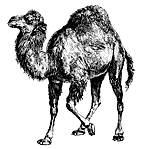
Perl Refreshments ⌘
Web Development - DB Management
Now that you have some idea how to create HTML with Perl, we can move on to something a bit more useful - how to access a database and manage the results.
It's one thing to access a database from Terminal or the command line, but a web environment requires a bit more.
First we have to connect to a database. Whichever one you have available will show you how to achieve this in Perl. I usually put the appropriate code in a subroutine (DBconnect), and call that near the beginning of my scripts.
I use SQLite as my database, but it follows most of the standard SQL rules. Most, if not all, of what follows should work for you.
Here is a typical block of code. Remember to put this code OUTSIDE of your here documemt code, and after you've defined and/or assigned the variables.
$sth is a String handler
$dbh is a Database handler
DBconnect();
$sth = $dbh->prepare( qq{select count(*) from books});
$sth->execute();
while (@records=$sth->fetchrow_array())
{
$NumBooks=$records[0];
}
$sth->finish();
This gets the number of elements in the table 'books', and places that value in the variable '$NumBooks'.
Most DB commands you will use are coded as a 3-step process:
- prepare
- execute
- finish
The first 2 lines of the code do that. Since most queries have a result, we need somewhere to put those results. A good choice is an array, although a hash also works.
while (@records=$sth->fetchrow_array())
That's what this line does. The array @records will hold the result/s.
In the while loop you can also do other things with the array elements.
Here is a more complicated query:
Get the title, author, etc. for all books that have a subject / keyword of (fill in the blank):
$sth=$dbh->prepare(qq{select books.titleid,title,pubyear,notes,filename,author,books.authorid from books,keywords,authors
where keyword like ?
and books.titleid=keywords.titleid
and authors.authorid=books.authorid
and books.authorid=keywords.authorid
order by title collate nocase});
$sth->execute("$Keyword");
while (@records=$sth->fetchrow_array()) {
$numK++;
$TitleID=$records[0];
$Title=$records[1];
$PubYear=$records[2];
$Notes=$records[3];
$FileName=$records[4];
$Author=$records[5];
$AuthorID=$records[6];
print qq{<li><a href="$DATAPATH/$FileName">$Title</a> [$TitleID]<br/>};
print qq{<span style="background-color:#06FF0B;border-radius:5px"> PDF: Click title to read online </span><br/>} if ($FileName =~ m/\.pdf/);
print qq{<span style="background-color:#abcdef;border-radius:5px"> EPUB: Click title to download </span><br/>} if ($FileName =~ m/\.epub/);
print qq{<span style="background-color:#FFAE05;border-radius:5px"> MOBI: Click title to download </span><br/>} if ($FileName =~ m/\.mobi/);
print qq{Author/s: <span class="field">$Author</span><br/>};
print qq{Pub. Year: <span class="field">$PubYear</span><br/>};
GetKeywords($AuthorID,$TitleID);
}
For step 1, we prepare the select statement. We include the table name for some of the column names to clarify which one we want (titleid and authorid is in 2 of the tables).
select books.titleid, ... books.authorid
This is crucial to avoid SQL Injections.
where keyword like ?
Then we ensure that titleid and authorid match in the relevant tables.
and books.titleid=keywords.titleid and authors.authorid=books.authorid and books.authorid=keywords.authorid
And last we sort the results by title, disregarding upper or lower case letters.
order by title collate nocase});
Now the execute command (step 2). This is where we tell the query what the placeholder contains. In this case it's the keyword we previously acquired in the $Keyword variable.
Finally (step 3) we get the results in the @records array, but first, we increment a counter variable ($numK).
This is also where we can assign variables to the specific elements of the @records array - note they have to follow the same order as the select statement.
And where we can now print the results or our query.
A call to the sub-routine (GetKeywords($AuthorID,$TitleID) finishes off the while loop. This was defined previously:
sub GetKeywords {
@mykeys=();
($AuthorID,$TitleID)=@_;
$sth2=$dbh->prepare(qq{select keyword from keywords
where authorid=$AuthorID
and titleid=$TitleID
order by keyword});
$sth2->execute();
while(@records2=$sth2->fetchrow_array()) {
push(@mykeys,$records2[0]);
}
$sth2->finish();
} # GetKeywords
Since this sub-routine is called from within a loop which is already using $sth and @records
we don't want to use those variables.
Disaster imminent.
Now that the associated keywords are in an array (@mykeys), we can also print them as part of the data associated with a particular book.